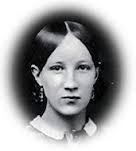Canandaigua, N.Y.
November 21, 1852.–I am ten years old to-day, and I think I will write a journal and tell who I am and what I am doing. I have lived with my Grandfather and Grandmother Beals ever since I was seven years old, and Anna, too, since she was four. Our brothers, James and John, came too, but they are at East Bloomfield at Mr Stephen Clark’s Academy. Miss Laura Clark of Naples is their teacher.
Anna and I go to school at District No. 11. Mr James C. Cross is our teacher, and some of the scholars say he is cross by name and cross by nature, but I like him. He gave me a book by the name of ” Noble Deeds of American Women,” for reward of merit, in my reading class. To-day, a nice old gentleman, by the name of Mr William Wood, visited our school. He is Mrs Nat Gorham’s uncle, and Wood Street is named for him. He had a beautiful pear in his hand and said he would give it to the boy or girl who could spell “virgaloo,” for that was the name of the pear. I spelt it that way, but it was not right. A little boy, named William Schley, spelt it right and he got the pear. I wish I had, but I can’t even remember now how he spelt it. If the pear was as hard as the name, I don’t believe any one would want it, but I don’t see how they happened to give such a hard name to such a nice pear. Grandfather says perhaps Mr Wood will bring in a Seckle pear some day, so I had better be ready for him.
Grandmother told us such a nice story to-day I am going to write it down in my journal. I think I shall write a book some day. Miss Caroline Chesebro did, and I don’t see why I can’t. If I do, I shall put this story in it. It is a true story and better than any I found in three story books Grandmother gave us to read this week, “Peep of Day,” “Line Upon Line,” and “Precept Upon Precept,” but this story was better than them all. One night Grandfather was locking the front door at nine o’clock, and he heard a queer sound, like a baby crying. So he unlocked the door and found a bandbox on the stoop, and the cry seemed to come from inside of it. So he took it up and brought it into the dining-room and called the two girls, who had just gone upstairs to bed. They came right down and opened the box, and there was a poor little girl baby, crying as hard as could be. They took it out and rocked it and sung to it and got some milk and fed it and then sat up all night with it, by the fire. There was a paper pinned on the baby’s dress with her name on it, “Lily T. LaMott,” and a piece of poetry called “Pity the Poor Orphan.” The next morning, Grandfather went to the overseer of the poor and he said it should be taken to the county house, so our hired man got the horse and buggy, and one of the girls carried the baby and they took it away. There was a piece in the paper about it and Grandmother pasted it into her “Jay’s Morning and Evening Exercises,” and showed it to us. It said, “A Deposit After Banking Hours.” “Two suspicious looking females were seen about town in the afternoon, one of them carrying an infant. They took a train early in the morning without the child. They probably secreted themselves in Mr Beals’ yard and if he had not taken the box in they would have carried it somewhere else.” When Grandfather told the clerks in the bank about it next morning, Mr Bunnell, who lives over by Mr Daggett’s, on the park, said, if it had been left at some people’s houses it would not have been sent away. Grandmother says they heard that the baby was adopted afterwards by some nice people in Geneva. People must think this is a nice place for children, for they had eleven of their own before we came. Mrs McCoe was here to call this afternoon and she looked at us and said : “It must be a great responsibility, Mrs Beals.” Grandmother said she thought “her strength would be equal to her day.” That is one of her favourite verses. She said Mrs McCoe never had any children of her own and perhaps that is the reason she looks so sad at us. Perhaps some one will leave a bandbox and a baby at her door some dark night.
